Written By: William Gregory | September 14, 2025 |
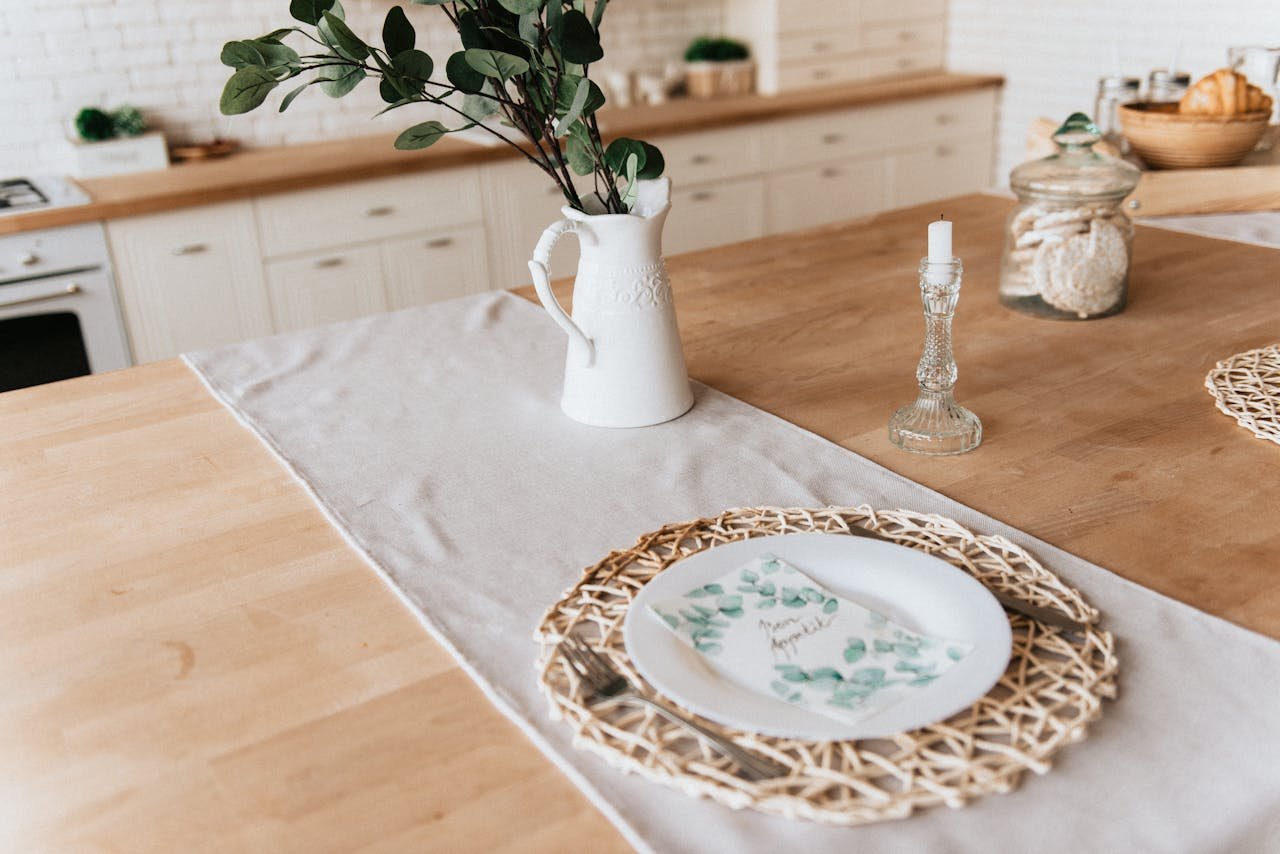
There’s something about Melbourne kitchens, isn’t there? Maybe it’s the way they become the unofficial headquarters for Sunday morning coffee rituals, or how they transform into command centers during those endless lockdown baking phases we all went through. Whatever it is, when you’re staring at your dated benchtops and thinking “it’s time,” one question looms larger than all the Pinterest boards combined: how long does it take to renovate a kitchen?
Here’s the thing—and I say this with all the love for our beautiful, complicated city—asking how long it takes is a bit like asking how long a piece of string is. Except this string has permit requirements, weather delays, and the occasional surprise asbestos discovery (thanks, vintage Californian bungalows).
But let’s cut through the uncertainty. Most projects take anywhere from 6 to 16 weeks from the moment demolition starts until you’re brewing that celebratory first coffee in your new space. Understanding the timeline helps you plan around the chaos—and keeps your sanity intact while living without a kitchen.
The actual renovation time depends on whether you’re doing a straightforward refresh or completely reimagining your space. The complexity of your design, the scope of work, and those city-specific factors (hello, unpredictable weather and heritage overlays) all play a role in how long you renovation might take.
Let’s be honest about something upfront—those slick renovation shows that promise transformations in a weekend? They’re about as realistic as finding street parking in Fitzroy on a Saturday afternoon. Real renovation projects take time, and understanding the phases helps you get a clear idea of how long you’ll be eating takeaway.
Picture this: your layout works beautifully, but everything’s looking a bit tired. The cabinet doors are solid but screaming for an update, the benchtops have seen better days, and don’t even get started on that backsplash. This is what we call a cosmetic kitchen reno, and it’s the fastest route to a transformed space.
You’re looking at roughly 4 to 8 weeks here. Week one typically involves demolition—out with the old benchtops, appliance disconnection, and if you’re replacing cabinet fronts or entire units, they’ll come out too. Then comes the installation phase: new cabinetry goes in, benchtops get templated and fitted (stone bench tops usually need about a week for fabrication), and your shiny new appliances arrive. Tile work, painting, and those finishing touches round out the process.
Now we’re getting into proper transformation territory. Maybe you’re knocking down that wall between the kitchen and dining room (hello, open-plan living), shifting the sink to the island, or completely reconfiguring where everything sits. This is where Melbourne homeowners really make their mark, creating spaces that actually suit how they live rather than working around someone else’s 1970s design choices.
Renovating your kitchen at this level means you’re touching everything—plumbing gets rerouted, electrical work multiplies (because who doesn’t need seventeen places to charge devices these days?), and the whole room essentially gets rebuilt. You’re looking at 8 to 12 weeks minimum for the kitchen renovation process, sometimes stretching to 16 if your project involves structural changes or if you’re waiting on custom cabinetry from that boutique maker in Abbotsford you fell in love with.
Here’s where Melbourne-specific factors start playing a bigger role. Council permits for structural work can add 4-6 weeks to your timeline before you even start—and that’s if everything goes smoothly. Building surveyors need to sign off on plans, and depending on your council (looking at you, Boroondara), that process varies wildly.
The process to install a kitchen involves coordinating multiple trade professionals—your plumber and electrician need to work in sequence, tilers follow cabinet installation, and everything needs inspection before you can proceed. It’s a carefully choreographed dance.
Some spaces need more than a renovation—they need a revolution. Maybe you’re dealing with a heritage home where nothing’s level, or you’ve discovered the previous owner’s “creative” electrical work that’s making your electrician shake their head. Perhaps you’re extending into the backyard, adding skylights, or completely reimagining the space from floor to ceiling.
Gut renovations are a different beast entirely. Everything goes—walls, floor materials, ceiling, the lot. It’s like starting with an empty box and building your dream kitchen from scratch. These house renovation projects typically run 12 to 16 weeks, but I’ve seen them stretch longer when heritage overlays are involved or when you’re coordinating multiple trades for complex builds.
The upside? You get exactly what you want. The downside? You need patience, a robust temporary setup, and a really understanding relationship with your local takeaway joints. This is where wondering how long becomes less important than accepting the journey to create your dream kitchen.
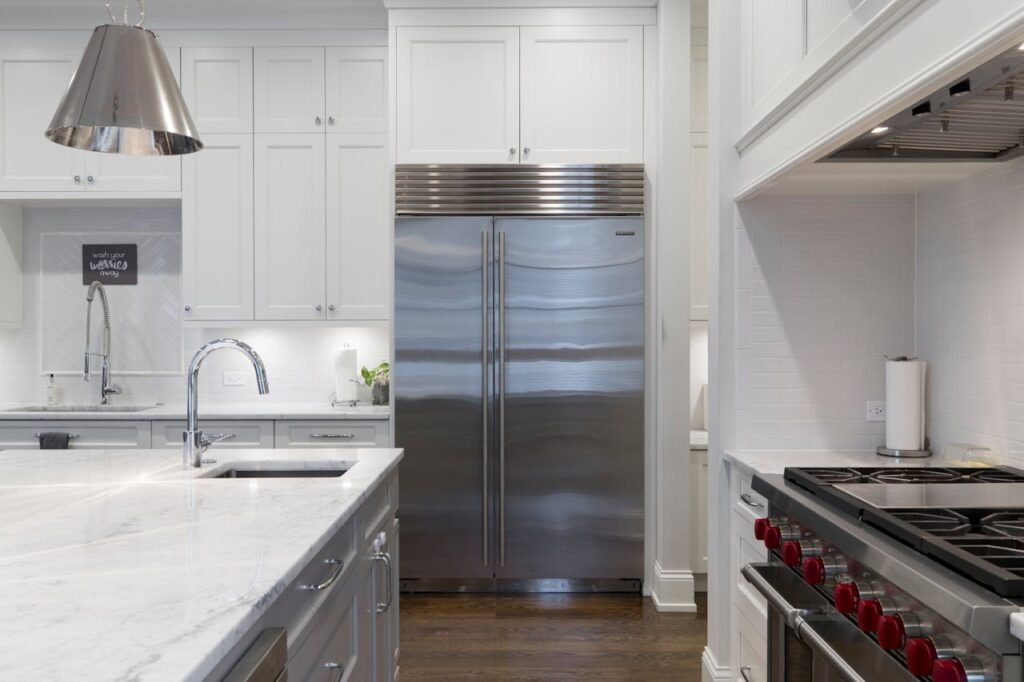
You know what surprises most homeowners? It’s not the construction that eats up renovation time—it’s everything happening before a single cabinet gets installed. Let’s walk through where your weeks actually disappear in a typical kitchen renovation.
Before anyone swings a sledgehammer, you need a plan. And not just any plan—a proper, thought-out kitchen design that accounts for everything from where you’ll store your Le Creuset collection to how morning sun hits the benchtop.
Working with a kitchen designer or architect typically takes 2-4 weeks for straightforward renovation projects, stretching to 6 weeks or more for complex builds. You’ll go through multiple revisions, select materials (a process that somehow takes longer than you’d think—stone bench tops options alone could fill a warehouse), and finalize every small detail.
This phase also includes getting quotes from builders. Smart move? Get at least three. Victorias building market is competitive, and kitchen renovation costs can vary significantly. Some builders rush quotes; others take their time to properly assess the job and provide an accurate cost estimate. The latter usually results in fewer surprises down the track.
Your kitchen designer will help you understand not just aesthetics but also how long it takes to source specific materials. That imported tap you love? Might have a 12-week lead time. Better to know now than when you’re mid-project.
Ah yes, permits. Our council permit system is… well, it’s something. If you’re doing anything structural—removing walls, adding windows, changing the roofline—you’ll need a building permit. That process typically takes 4-6 weeks, sometimes 8 if your property has a heritage overlay or you’re in a particularly bureaucratic council area.
Minor works often fly under the radar, but don’t skip this step. Building without permits can come back to haunt you when you sell, and trust me, explaining unpermitted work to a conveyancer is nobody’s idea of fun. Understanding costs includes factoring in permit fees, which vary by council and scope of work.
Some councils also require Town Planning permits for external changes or if you’re in a protected area. These can add another 6-8 weeks and sometimes require neighbour notification. Kitchen renovation in Victoria comes with these regulatory realities—it’s all very… us.
Finally, the satisfying bit. Demolition is quick—usually 3 to 5 days depending on the size of your kitchen and complexity. Out come the old cabinets, benchtops, and appliance units. Tile gets jackhammered off walls. That questionable laminate flooring from 1985? Gone. Renovating your old kitchen starts here, and it’s dramatic.
If you’re in an older home (and let’s face it, many of us are), this is when surprises emerge. Asbestos in the floor adhesive. Wiring that predates safety standards. Plumbing that makes no logical sense whatsoever. Good builders factor contingency time for these discoveries, but they can still affect how long it takes to renovate your space.
This phase typically takes a few days, but don’t be surprised if it extends to nearly a week for larger spaces or when dealing with unexpected structural issues. Demolition of your old kitchen often reveals what you’re really working with.
This is where trade professionals start descending on your home like a particularly organized swarm. Your electrician runs new cables, your plumber roughs in water lines and drainage, and if you’re doing gas cooking, the gas fitter makes an appearance. This is when the real transformation begins, even though you can’t see much happening yet.
In Melbourne, all plumbing or electrical work requires licensed tradespeople—no DIY allowed, which is honestly a good thing given our weather extremes and the importance of proper waterproofing. This phase typically takes 1-2 weeks for straightforward jobs, stretching to 3 weeks if you’re moving plumbing extensively or dealing with a complicated electrical upgrade for your new kitchen.
The time to install rough plumbing and electrical depends partly on your existing infrastructure. Older homes might need complete rewiring; newer builds might just need minor modifications. Trade costs vary accordingly, but cutting corners here is false economy.
Weather can impact external work during this phase. Those beautiful days where you experience four seasons before lunch? They’re not ideal for exterior construction. Smart builders schedule accordingly, understanding that renovation time can stretch if Mother Nature doesn’t cooperate.
Now things start looking like a proper space again. New cabinets go in first—a process taking anywhere from 2 days for a small space to a week for something more substantial, especially if you’ve gone custom. The size of your kitchen directly impacts this schedule, as does cabinetry complexity. Custom joinery takes more time than flat-pack solutions, but the quality difference is significant.
Then comes benchtop templating, fabrication, and installation (factor in 7-10 days for stone countertops). Tiling happens next, followed by second-fix plumbing and electrical (installing lights, powerpoints, taps, the dishwasher). Your plumber and electrician return to connect everything properly.
Painting, splashback installation, and appliance connection round out this phase. For a standard kitchen, you’re looking at 3-4 weeks. More complex projects with custom joinery, elaborate tile patterns, or feature elements can often take 5-6 weeks. The bigger kitchen you’re building, the longer this phase runs.
The city’s humidity—or lack thereof—affects tiling and painting schedules. Summer installations can dry faster, but extreme heat might require careful timing. Winter brings its own challenges with longer drying times and occasional weather delays if exterior work’s involved. This is one reason the kitchen renovation cost in Melbourne sometimes includes weather contingencies.
Understanding how long a kitchen takes means appreciating these sequential steps. You can’t install benchtops before cabinets are in. You can’t tile before plumbing is roughed in. Each trade builds on the previous one’s work.
The last week involves final installations, touch-ups, and fixing those inevitable little issues. Handles get fitted to cabinets, silicone gets applied around benchtops and sinks, appliance units get connected and tested. Everything gets cleaned within an inch of its life. Building inspectors make their final visit, and you get walked through how everything in your new kitchen works.
This phase often feels longer than it is because you’re so close to being done. But rushing these finishing touches leads to problems—better to let your builder properly finish the job. That extra day or two spent on small details makes the difference between a good outcome and a great one.
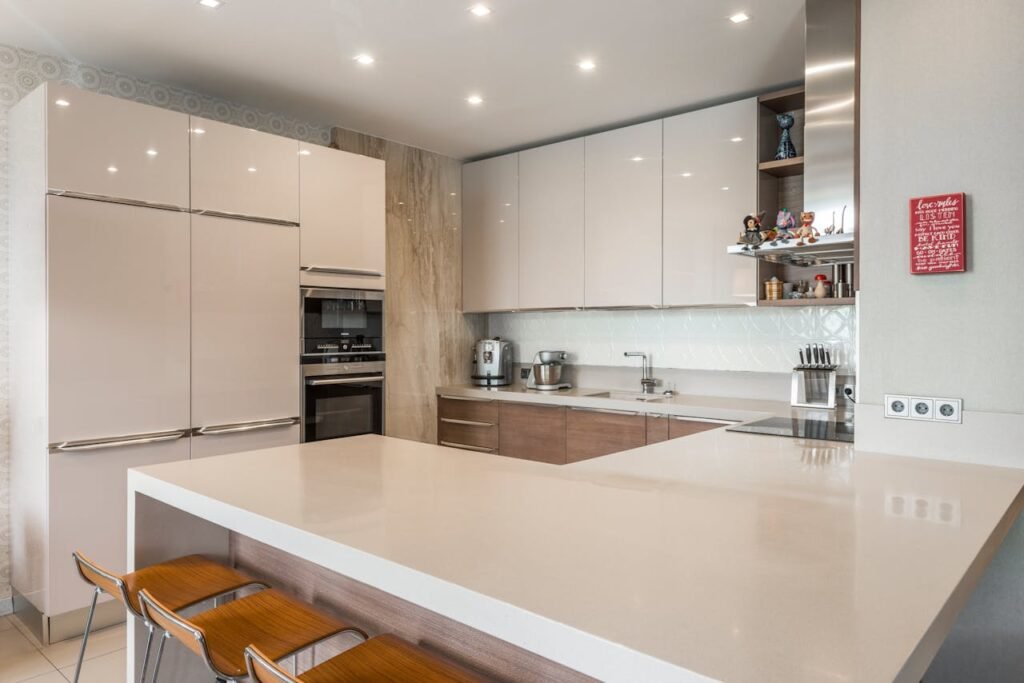
Some factors affecting your timeline are within your control; others are gifts from the renovation gods (who apparently have a wicked sense of humor).
Making decisions quickly might sound obvious, but it’s huge. Every day spent debating tile colors is a day your builder’s schedule shifts. Have your selections locked in before work starts—yes, even the small stuff like handles and powerpoint finishes. Decisive homeowners get their spaces completed faster.
Choosing readily available materials matters enormously. That Italian tile range you love? Beautiful. Also: 16-week lead time from Europe. Standard materials from local suppliers like Beaumont Tiles or Reece Bathrooms arrive in days, not months. This is where understanding lead times during planning pays off—you can still get premium finishes without the wait if you choose smartly.
Clear site access helps enormously. If your builder needs to lug materials through a narrow side passage in Hawthorn or navigate tight streets in Carlton, factor in extra time. Ground floor renovations with drive-up access move faster than second-story walk-ups. Consider how easily trades can get in and out—it affects efficiency more than you’d think.
Being available for decisions keeps momentum going. When your builder messages about an unexpected structural issue, answering within hours rather than days means work continues rather than stalling. The renovation process flows smoothly when communication is quick.
Custom cabinetry is gorgeous—and worth the wait if that’s your priority—but it adds 4-8 weeks to your schedule. Same goes for imported materials, specialized finishes, or anything requiring bespoke fabrication. If you want your specific kitchen vision realized with custom elements, build that extra time into expectations.
Structural surprises are a specialty. That termite damage in the floor joists? Wasn’t on anyone’s original schedule. Asbestos testing and removal add time and cost. Heritage buildings often reveal surprises requiring heritage consultant approvals before proceeding. This is one of the most common mistakes—underestimating what you’ll find inside walls.
Coordination issues between trades can cause delays. If your electrician can’t come until next Tuesday but the cabinetmaker is ready Monday, you’re waiting. Good builders minimize this through careful scheduling, but it still happens. Multiple professionals working on renovation projects need careful choreography.
Material shortages became painfully common recently. While improving, supply chain issues still occasionally bite. Your chosen appliance units might be backordered, or that specific timber veneer could be out of stock. Flexibility helps—have backup options identified. This is where knowing your kitchen renovation costs upfront, including alternatives, proves valuable.
Weather delays affect external work in Melbourne. Heavy rain stops outdoor construction, delays drainage work, and can prevent some materials from being delivered. Melbourne’s unpredictable weather means smart builders include weather contingency in their schedules. Kitchen renovation in Melbourne needs weather buffers built in.
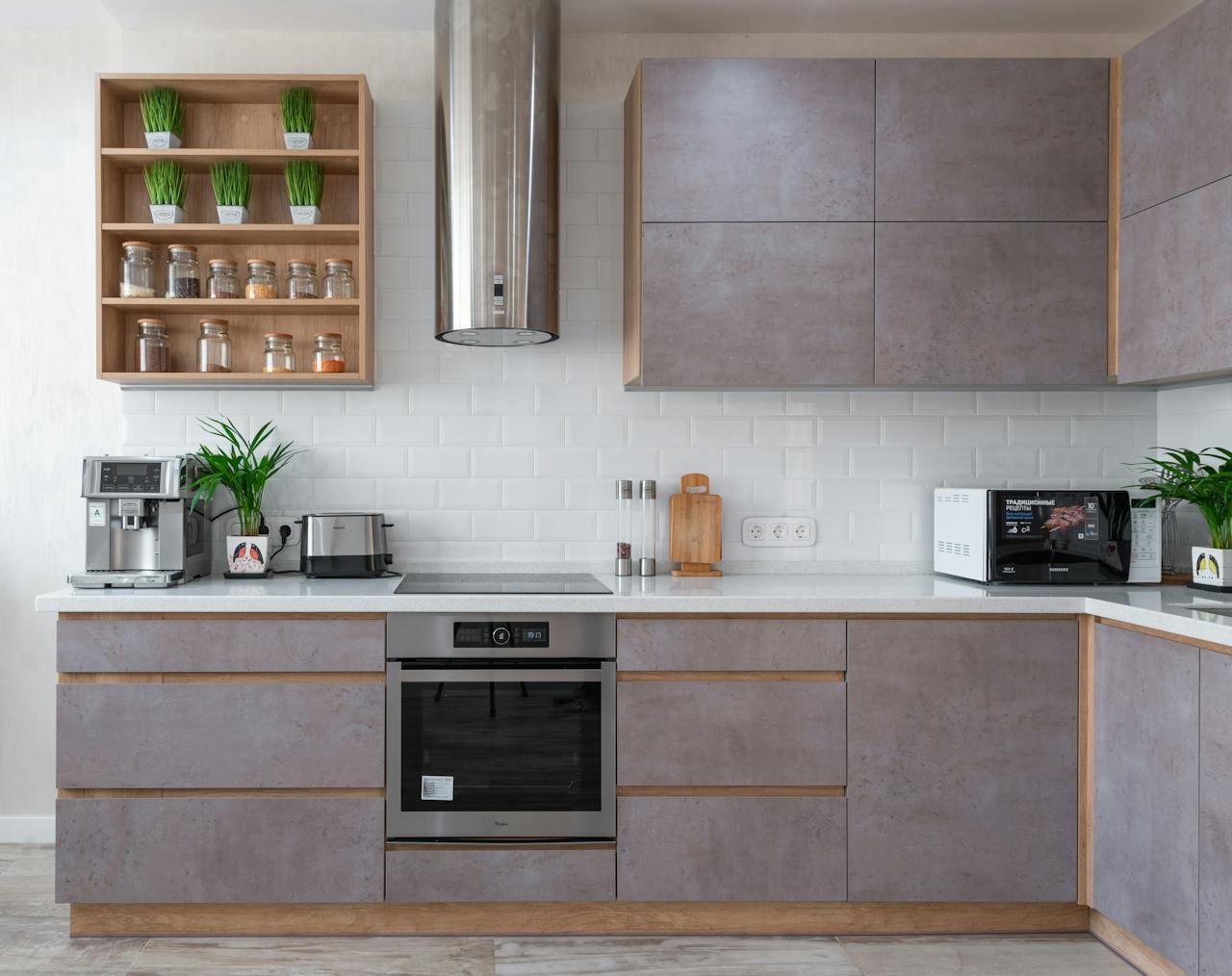
Renovating here comes with unique considerations that builders in, say, Brisbane or Perth don’t necessarily face. Understanding these helps set realistic expectations for how long your transformation will take.
Our weather is famously unpredictable, and it affects schedules more than you’d think. Winter brings shorter daylight hours, affecting how long trades can work on natural light-dependent tasks. Rain delays outdoor work—and when you’re knocking out external walls for that new bi-fold door opening, rain stops everything.
Summer brings its own issues. Extreme heat affects adhesive curing times and makes certain tasks dangerous for workers. Smart renovators schedule weather-dependent work accordingly, but Mother Nature doesn’t always cooperate. This is reality for any kitchen renovation—weather will impact your schedule.
Not all city councils handle permits identically. Boroondara’s known for thorough (read: slow) assessments. Yarra moves faster but has strict heritage requirements in areas like Collingwood and Richmond. Bayside has its own quirks around coastal building regulations.
Understanding your council’s specific requirements helps set realistic expectations for your home renovation. A good builder knows these variations and factors them into scheduling. Kitchen renovation costs can also vary based on local permit requirements and inspection fees.
Melbourne loves its heritage buildings—and fair enough, they’re gorgeous. But renovating in heritage overlay areas adds complexity. Changes affecting the building’s exterior often require planning permits and heritage consultant reports. Even internal changes can require approvals if they affect structural elements.
This doesn’t mean don’t renovate—it means factor in extra time for approvals and potentially more restrictions on what you can change. This sometimes means adding weeks to your schedule.
Inner city suburbs famous terrace houses and Victorian workers’ cottages weren’t designed with modern renovations in mind. Narrow hallways, tiny side passages, and limited parking affect how materials get delivered and waste gets removed. This can add days to your schedule, especially during the delivery-heavy installation phase.
Access challenges particularly affect the size of the kitchen you can practically build. Getting large benchtop slabs through narrow corridors requires planning (and sometimes temporarily removing doors or windows). Trade costs can increase when access is difficult, as jobs simply take longer.
Melbourne’s well-served by local suppliers—Reece, Beaumont Tiles, Harvey Norman Commercial—meaning standard materials arrive quickly. But specialty items might come from interstate or overseas, adding weeks to your schedule.
Building relationships with local suppliers helps. They’ll often expedite orders for regular customers or suggest readily available alternatives when your first choice is delayed. Smart renovators work with builders who have these supplier relationships already established.
Want your kitchen renovation to run smoothly? Here’s what actually helps, learned from countless Melbourne projects.
Have all selections made and confirmed before demolition day. Your builder should provide a detailed selections list—go through it methodically. Don’t leave anything “to be decided later.” Later becomes now very quickly, and delays cost money. This is perhaps the single biggest factor in keeping your kitchen renovation timeline on track.
Create a temporary setup that actually works. You’ll live with it for weeks, maybe months. Get a decent microwave, set up a sink area somewhere, and identify which nearby cafes do good coffee. You’ll be visiting them often. Living without a kitchen is challenging—plan for it properly.
Establish clear communication channels with your builder. How often will you receive updates? What’s the best way to ask questions? When should you visit the site (and when should you stay away)?
Regular site meetings help catch issues early. Most builders schedule weekly check-ins—use them. Ask questions. Voice concerns before they become problems. Good renovators stay involved without micromanaging—it’s a balance, but communication is key.
Whatever schedule your builder quotes, add a buffer. If they say 10 weeks, plan for 12-13. This isn’t pessimism—it’s reality. Something always takes longer than expected, whether it’s weather, a material delay, or discovering your walls aren’t actually straight.
This mental buffer reduces stress enormously. When things run to schedule, you’ll be pleasantly surprised rather than constantly anxious about how long your kitchen project is taking. Take around 20% extra time in your mental planning—you’ll thank yourself later.
Good builders know what they’re doing—let them work. But stay involved. Review progress regularly. Check that work matches plans. Catch mistakes early when they’re easy to fix rather than discovering them after cabinets are installed.
Don’t be afraid to ask questions. “Why are we doing it this way?” is perfectly reasonable. Good builders explain their reasoning and welcome informed clients. Understanding the process makes you a better client and typically results in a better outcome.
Here’s something worth considering: kitchen renovation costs and schedules are intimately connected. Rushing a job to save time often costs more in the long run. Conversely, allowing proper time for each phase typically results in better workmanship and fewer costly mistakes.
Costs in Melbourne vary widely—from $25,000 for a basic refresh to $80,000+ for high-end transformations. For a detailed breakdown of what influences these figures, check out our complete guide on How Much Does a Kitchen Renovation Cost in Melbourne?“
Trade costs reflect skill and experience. That cheaper quote might look appealing, but if it results in delays because trades aren’t coordinated properly, you’re not saving money—you’re losing it. Quality builders factor proper scheduling and skilled professionals into their pricing.
Material costs also affect schedules. Budget materials are readily available; premium options might take weeks to source. Understanding this relationship helps you make informed decisions. Sometimes paying a bit more for readily available premium materials actually shortens your schedule compared to waiting for imported budget alternatives.
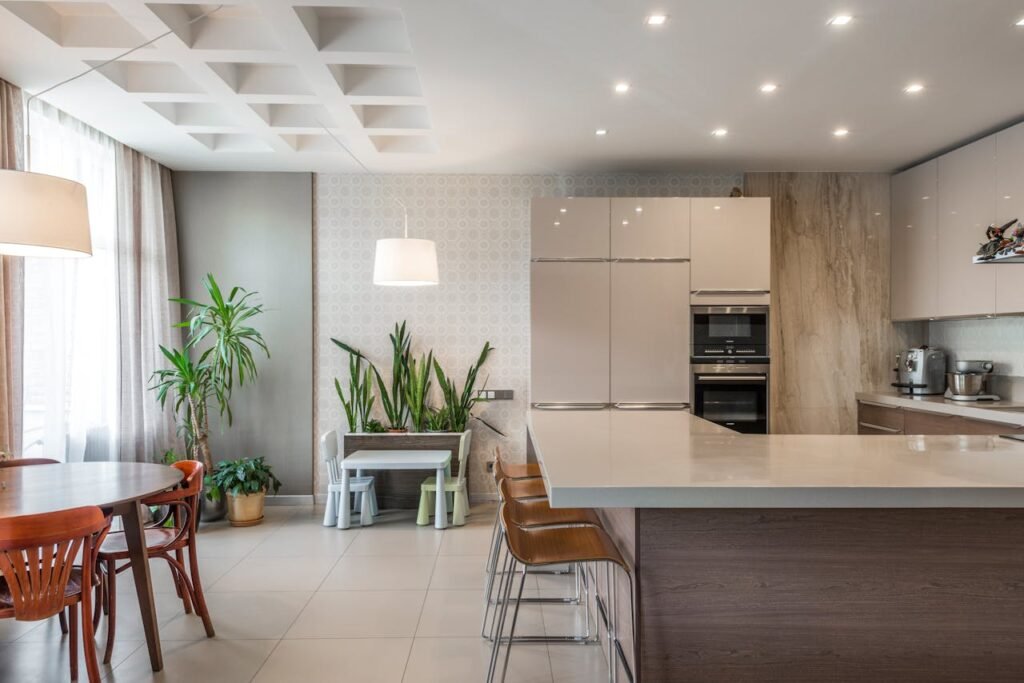
So, how long does it take to renovate a kitchen in Melbourne? Here’s the honest truth: for most projects, you’re looking at 3-4 months from signing the builder’s contract to cooking in your new space.
That breaks down roughly as: 4-6 weeks for permits and pre-construction preparation, then 6-10 weeks of actual building work for a standard kitchen. Complex projects with structural changes, custom cabinetry, or heritage considerations might take around 5-6 months total.
For a quick cosmetic refresh? Plan for 8-10 weeks total including planning.
For a full kitchen remodel with layout changes? Expect 12-16 weeks minimum.
For a complete gut renovation? You’re looking at 16-24 weeks, potentially more.
The key is starting with realistic expectations. Talk openly with your builder about schedules. Ask about potential delays. Understand what’s in your control (decisions, selections, payments) and what isn’t (permits, weather, surprise structural issues).
Remember, you’re not just building a space—you’re creating a room you’ll use daily for years. Rushing to save a few weeks often leads to compromises you’ll live with far longer than the schedule itself. Get an idea of how long each phase takes, then plan accordingly.
Yes, living through a renovation tests patience. Yes, you’ll get sick of washing dishes in the bathroom. Yes, you’ll have moments wondering why you didn’t just reface the cabinets and call it done. The question “how long it takes to renovate” starts feeling very personal when you’re living through it.
But when you’re finally standing in your completed space, brewing that first coffee and appreciating how everything works exactly how you envisioned? That makes every week of chaos worthwhile. Our kitchens are special—they’re where life happens. Kitchen is one of those spaces that truly defines a home. Taking the time to get yours right means creating room for the new kitchen of your dreams—a space that serves you beautifully for years to come.
Start with a clear plan, choose your team carefully, set realistic expectations based on the size of the kitchen and complexity of work, and trust the process. Whether you’re tackling a small refresh or creating your ideal space, understanding how long it takes—and why—helps you navigate the journey with confidence.
Your dream kitchen is worth the wait. And when you’re finally cooking in your transformed space, you’ll forget exactly how long it took—you’ll just enjoy where you are.